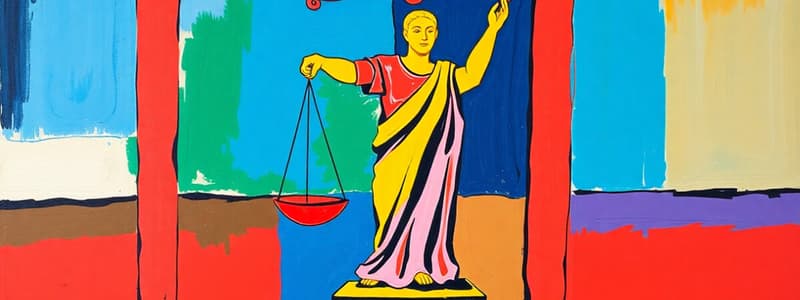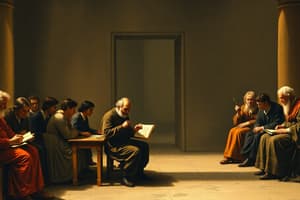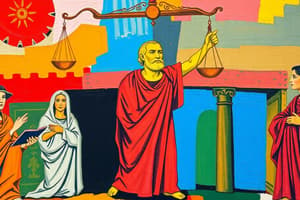Podcast
Questions and Answers
According to Plato's theory of Forms, what is the relationship between the physical world we perceive and the realm of Forms?
According to Plato's theory of Forms, what is the relationship between the physical world we perceive and the realm of Forms?
- The physical world is a reflection of the realm of Forms, but it is constantly changing and imperfect. (correct)
- The realm of Forms is a mere figment of our imagination, while the physical world is the true reality.
- The physical world and the realm of Forms are identical, and they exist in perfect harmony with each other.
- The physical world is completely independent of the realm of Forms, which has no influence on our reality.
What is the primary function of the 'reason' component within Plato's tripartite soul?
What is the primary function of the 'reason' component within Plato's tripartite soul?
- To provide emotional strength and courage in the face of adversity.
- To satisfy basic desires and impulses, ensuring the survival of the individual.
- To seek and understand the truth through knowledge and philosophical inquiry.
- To control and guide the 'spirit' and 'appetite' components of the soul. (correct)
In Plato's ideal state, what is the primary role of the 'Guardians'?
In Plato's ideal state, what is the primary role of the 'Guardians'?
- To provide for the material needs and desires of the citizens.
- To ensure the education and moral development of all citizens.
- To defend the state from external threats and maintain order within its borders. (correct)
- To govern the state with wisdom and knowledge.
According to Plato, why is the Philosopher King best suited to rule?
According to Plato, why is the Philosopher King best suited to rule?
What is the main purpose of the Allegory of the Cave, as presented in Plato's Republic?
What is the main purpose of the Allegory of the Cave, as presented in Plato's Republic?
Which of the following is NOT a characteristic of Plato's ideal state?
Which of the following is NOT a characteristic of Plato's ideal state?
According to Plato, what is the primary role of the 'Producers' in his ideal state?
According to Plato, what is the primary role of the 'Producers' in his ideal state?
What is one of the main criticisms that has been leveled against Plato's Republic?
What is one of the main criticisms that has been leveled against Plato's Republic?
Flashcards
Plato's Republic
Plato's Republic
A foundational text exploring justice, ideal state, and reality.
Theory of Forms
Theory of Forms
Physical world is a shadow of perfect, unchanging Forms.
Tripartite Soul
Tripartite Soul
Plato's division of the soul into reason, spirit, and appetite.
Ideal State
Ideal State
Signup and view all the flashcards
Allegory of the Cave
Allegory of the Cave
Signup and view all the flashcards
Philosopher-King
Philosopher-King
Signup and view all the flashcards
Justice in the Soul
Justice in the Soul
Signup and view all the flashcards
Critique of Republic
Critique of Republic
Signup and view all the flashcards
Study Notes
Overview of Plato's Republic
- Plato's Republic is a foundational text in Western philosophy, exploring justice, the ideal state, and the nature of reality.
- It presents a philosophical dialogue, primarily featuring Socrates, exploring these concepts with various interlocutors.
- The work is structured as a series of discussions and arguments, engaging with diverse viewpoints on the subject.
The Theory of Forms
- Plato proposes the theory of Forms, arguing that the physical world we perceive is merely a shadow of a higher realm of perfect, unchanging Forms.
- These Forms represent the essence or ideal examples of things, like justice, beauty, and goodness.
- For example, a physical chair is imperfect, but the Form of a Chair is perfect and eternal.
Justice in the Soul
- The Republic argues that justice, not just in the state, but also in the individual soul, is crucial.
- Plato connects justice to the tripartite soul: reason, spirit, and appetite.
- A just individual has these elements harmoniously working together, with reason ruling over spirit and appetite.
The Ideal State
- Plato outlines an ideal state in his Republic.
- This state is structured in a hierarchical manner, with different classes performing different functions.
- The philosopher-kings, guided by reason, rule the state.
- This reflects Plato’s belief in the importance of wisdom and philosophical understanding in governance.
- Guardians, imbued with courage and strength, protect the state.
- Producers, driven by their needs and appetites, provide for the needs of the state.
- The ideal state is designed to promote harmony and justice.
The Allegory of the Cave
- The Allegory of the Cave, a powerful metaphor, illustrates the theory of Forms.
- Prisoners chained in a cave see only shadows of reality.
- One prisoner escapes and ascends into the light, encountering the true forms.
- The allegory represents the journey from ignorance to knowledge and enlightenment.
- This journey towards knowledge was central to Plato's philosophy.
The Philosopher King
- Plato asserts that philosopher-kings are the most suitable rulers.
- These individuals possess the knowledge of the Forms and are guided by reason.
- They are thus well-suited to make decisions in the best interest of the state.
- Their rule is based on knowledge, not personal ambition or wealth.
Critique and Legacy
- Plato's Republic, despite its enduring influence, has faced considerable critique over the centuries.
- Some argue that the ideal state is unrealistic or that its hierarchical structure is unjust.
- The relevance and applicability of his ideas remain a subject of discussion and debate.
- The Republic has significantly shaped Western political thought and philosophy.
- Its concepts continue to inspire and challenge modern thinkers and scholars.
Studying That Suits You
Use AI to generate personalized quizzes and flashcards to suit your learning preferences.




